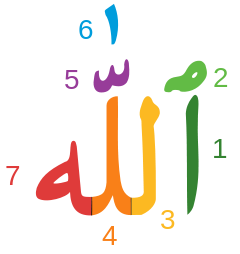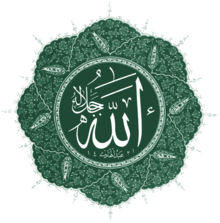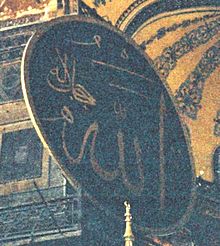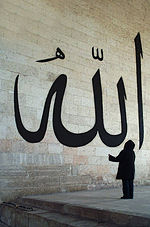- Allah
-
This article is about the word "Allah". For the Islamic conception of God, see God in Islam.For other uses, see Allah (disambiguation).
Allah (English pronunciation: /ˈælə/ or /ˈɑːlə/; Arabic: الله Allāh, IPA: [ʔɑlˈlɑː] (
 listen), [ʔalˤˈlˤɑː]) is a word for God used in the context of Islam.[1] In Arabic, the word means simply "God".[2][3][4] It is used primarily by Muslims and Bahá'ís, and often, albeit not exclusively, used by Arabic-speaking Eastern Catholic Christians, Maltese Roman Catholics, Eastern Orthodox Christians, Mizrahi Jews and Sikhs.[5][6][7] It is related to ʼĔlāhā in Aramaic.
listen), [ʔalˤˈlˤɑː]) is a word for God used in the context of Islam.[1] In Arabic, the word means simply "God".[2][3][4] It is used primarily by Muslims and Bahá'ís, and often, albeit not exclusively, used by Arabic-speaking Eastern Catholic Christians, Maltese Roman Catholics, Eastern Orthodox Christians, Mizrahi Jews and Sikhs.[5][6][7] It is related to ʼĔlāhā in Aramaic.Contents
Etymology
 The Arabic components that build-up the word "Allah":
The Arabic components that build-up the word "Allah":
1. alif
2. hamzat waṣl (همزة وصل)
3. lām
4. lām
5. shadda (شدة)
6. dagger alif (ألف خنجرية)
7. hāʾThe term Allāh is derived from a contraction of the Arabic definite article al- "the" and ʾilāh "deity, god" to al-lāh meaning "the [sole] deity, God" (ὁ θεὸς μόνος, ho theos monos).[8] Cognates of the name "Allāh" exist in other Semitic languages, including Hebrew and Aramaic.[9] Biblical Hebrew mostly uses the plural form (but functional singular) Elohim. The corresponding Aramaic form is ʼĔlāhā ܐܠܗܐ in Biblical Aramaic and ʼAlâhâ ܐܲܠܵܗܵܐ in Syriac as used by the Assyrian Church, both meaning simply "God".[10] In the Sikh scriptures, Guru Granth Sahib, the term Allah (Punjabi: ਅਲਹੁ) is used 46 times respectively.
The name was previously used by pagan Meccans as a reference to a creator deity, possibly the supreme deity in pre-Islamic Arabia.[11][12] The concepts associated with the term Allah (as a deity) differ among religious traditions. In pre-Islamic Arabia amongst pagan Arabs, Allah was not considered the sole divinity, having associates and companions, sons and daughters–a concept that was deleted under the process of Islamization. In Islam, the name Allah is the supreme and all-comprehensive divine name, and all other divine names are believed to refer back to Allah.[13] Allah is unique, the only Deity, creator of the universe and omnipotent.[5][6] Arab Christians today use terms such as Allāh al-ʾAb (الله الأب, "God the Father") to distinguish their usage from Muslim usage.[14] There are both similarities and differences between the concept of God as portrayed in the Qur'an and the Hebrew Bible.[15] It has also been applied to certain living human beings as personifications of the term and concept.[16][17]
Unicode has a codepoint reserved for Allāh, ﷲ = U+FDF2.[18] Many Arabic type fonts feature special ligatures for Allah.[19]
Usage in Arabic
Pre-Islamic Arabia
In pre-Islamic Arabia, Allah was used by Meccans as a reference to the creator-god, possibly the supreme deity.[20]
 Allah at Rohtas Fort Pakistan
Allah at Rohtas Fort Pakistan
Allah was not considered the sole divinity; however, Allah was considered the creator of the world and the giver of rain. The notion of the term may have been vague in the Meccan religion.[8] Allah was associated with companions, whom pre-Islamic Arabs considered as subordinate deities. Meccans held that a kind of kinship existed between Allah and the jinn.[21] Allah was thought to have had sons[22] and that the local deities of al-ʿUzzā, Manāt and al-Lāt were His daughters.[23] The Meccans possibly associated angels with Allah.[24][25] Allah was invoked in times of distress.[25][26] Muhammad's father's name was ʿAbd-Allāh meaning "the slave of Allāh"[25]
Islam
Main article: God in IslamSee also: Names of God in the Qur'anAccording to Islamic belief, Allah is the proper name of God,[27] and humble submission to His Will, Divine Ordinances and Commandments is the pivot of the Muslim faith.[5] "He is the only God, creator of the universe, and the judge of humankind."[5][6] "He is unique (wāḥid) and inherently one (ʾaḥad), all-merciful and omnipotent."[5] The Qur'an declares "the reality of Allah, His inaccessible mystery, His various names, and His actions on behalf of His creatures."[5]
In Islamic tradition, there are 99 Names of God (al-ʾasmāʾ al-ḥusnā lit. meaning: "The best names") each of which evoke a distinct characteristic of Allah.[6][28] All these names refer to Allah, the supreme and all-comprehensive divine name.[13] Among the 99 names of God, the most famous and most frequent of these names are "the Merciful" (ar-raḥmān) and "the Compassionate" (al-raḥīm).[6][28]
Most Muslims use the untranslated Arabic phrase ʾinšāʾ Allāh (meaning "God willing") after references to future events.[29] Muslim discursive piety encourages beginning things with the invocation of bismi-llāh (meaning "In the name of God").[30]
There are certain phrases in praise of God that are favored by Muslims, including "Subhan-Allah" (Holiness be to God), "Alhamdulillah" (Praise be to God), lā ʾilāha ʾilla-llāh (There is no deity but God) and "Allāhu Akbar" (God is great) as a devotional exercise of remembering God (zikr).[31] In a Sufi practice known as zikr Allah (lit. remembrance of God), the Sufi repeats and contemplates on the name Allah or other divine names while controlling his or her breath.[32]
Some scholars[who?] have suggested that Muhammad used the term Allah in addressing both pagan Arabs and Jews or Christians in order to establish a common ground for the understanding of the name for God, a claim Gerhard Böwering says is doubtful.[27] According to Böwering, in contrast with Pre-Islamic Arabian polytheism, God in Islam does not have associates and companions nor is there any kinship between God and jinn.[27] Pre-Islamic pagan Arabs believed in a blind, powerful, inexorable and insensible fate over which man had no control. This was replaced with the Islamic notion of a powerful but provident and merciful God.[33]
According to Francis Edwards Peters, "The Qur'an insists, Muslims believe, and historians affirm that Muhammad and his followers worship the same God as the Jews (29:46). The Koran's Allah is the same Creator God who covenanted with Abraham". Peters states that the Qur'an portrays Allah as both more powerful and more remote than Yahweh, and as a universal deity, unlike Yahweh who closely follows Israelites.[15]
Christianity
The Aramaic word for "God" in the language of Assyrian Christians is ʼĔlāhā, or Alaha. Arabic-speakers of all Abrahamic faiths, including Christians and Jews, use the word "Allah" to mean "God".[7] The Christian Arabs of today have no other word for 'God' than 'Allah'.[14] (Even the Arabic-descended Maltese language of Malta, whose population is almost entirely Roman Catholic, uses Alla for 'God'.) Arab Christians for example use terms Allāh al-ʾab (الله الأب) meaning God the Father, Allāh al-ibn (الله الابن) mean God the Son, and Allāh ar-rūḥ al-quds (الله الروح القدس) meaning God the Holy Spirit (See God in Christianity for the Christian concept of God).
Arab Christians have used two forms of invocations that were affixed to the beginning of their written works. They adopted the Muslim bismi-llah, and also created their own Trinitized bismi-llah as early as the eight century CE.[34] The Muslim bismi-llah reads: "In the name of God, the Compassionate, the Merciful." The Trinitized bismi-llah reads: "In the name of Father and the Son and the Holy Spirit, One God." The Syriac, Latin and Greek invocations do not have the words "One God" at the end. This addition was made to emphasize the monotheistic aspect of Trinitian belief and also to make it more palatable to Muslims.[34]
According to Marshall Hodgson, it seems that in the pre-Islamic times, some Arab Christians made pilgrimage to the Kaaba, a pagan temple at that time, honoring Allah there as God the Creator.[35]
Judaism
Main articles: Mizrahi Jews and Names of God in JudaismAs Hebrew and Arabic are closely related Semitic languages, it is commonly accepted that Allah (root, ʾilāh) and the Biblical Elohim are cognate derivations of same origin, as in Eloah a Hebrew word which is used (e.g. in the Book of Job) to mean "(the) God" and also "god or gods" as in the case of Elohim, ultimately deriving from the root El, "strong", possibly genericized from El (deity), as in the Ugaritic 'lhm "children of El" (the ancient Near Eastern creator god in pre-Abrahamic tradition).
In Jewish scripture Elohim is used as a descriptive title for the God of the scriptures whose name is YHWH, as well as for pagan gods.
As a loanword
English and other European languages
This article is part of the series: Islam 
The history of the word "Allāh" in English was probably influenced by the study of comparative religion in 19th century; for example, Thomas Carlyle (1840) sometimes used the term Allah but without any implication that Allah was anything different from God. However, in his biography of Muhammad (1934), Tor Andræ always used the term Allah, though he allows that this 'conception of God' seems to imply that it is different from that of the Jewish and Christian theologies. By this time Christians were also becoming accustomed to retaining the Hebrew term "YHWH" untranslated[dubious ] (it was previously translated as 'the Lord').[36]
Languages which may not commonly use the term Allah to denote God may still contain popular expressions which use the word. For example, because of the centuries long Muslim presence in the Iberian Peninsula, the word ojalá in the Spanish language and oxalá in the Portuguese language exist today, borrowed from Arabic (Arabic: إن شاء الله). This word literally means "God willing" (in the sense of "I hope so").[37]
Some Muslims leave the name "Allāh" untranslated in English.[38]
Malaysian and Indonesian language
Christians in Indonesia and Malaysia also use Allah to refer to God in the Malaysian language and Indonesian Language (both languages forms of the Malay language which is referred to as Bahasa Melayu).
Mainstream Bible translations in both languages use Allah as the translation of Hebrew Elohim (translated in English Bibles as "God").[39] This goes back to early translation work by Francis Xavier in the 16th century.[40][41] The first dictionary of Dutch-Malay by A.C. Ruyl, Justus Heurnius, and Caspar Wiltens in 1650 recorded "Allah" as the translation of the Dutch word "Godt".[42] Ruyl also translated Matthew in 1612 to Malay language (first Bible translation to non-European language, only a year after King James Version was published[43][44]), which was printed in the Netherlands in 1629. Then he translated Mark which was published in 1638.[45][46]
The government of Malaysia in 2007 outlawed usage of the term Allah in any other but Muslim contexts, but the High Court in 2009 revoked the law, ruling that it was unconstitutional. While Allah had been used for the Christian God in Malay for more than four centuries, the contemporary controversy was triggered by usage of Allah by the Roman Catholic newspaper The Herald. The government has in turn appealed the court ruling, and the High Court has suspended implementation of its verdict until the appeal is heard.
In other scripts and languages
Allāh in other languages with Arabic script is spelled in the same way. This includes Urdu, Persian/Dari, Uyghur among others.
- Bengali: আল্লাহ Allah
- Bosnian: Allah
- Chinese: 阿拉 Ālā, 安拉 Ānlā; 真主 Zhēnzhǔ (semantic translation)
- Greek: Αλλάχ Allách, Θεός Theós (God)
- Hebrew: אללה Allah
- Hindi: अल्लाह Allāh
- Malayalam: അള്ളാഹ് Aḷaḷah
- Japanese: アラー Arā, アッラー Arrā, アッラーフ Arrāfu
- Maltese: Alla
- Korean: 알라 Alla
- Polish: Allah, also archaic Allach or Ałłach
- Russian, Ukrainian, Bulgarian: Алла́х Allakh
- Serbian, Belarusian, Macedonian: Алах Alah
- Spanish, Portuguese: Alá
- Thai: อัลลอฮ์ Anláw
- Punjabi (Gurmukhi): ਅੱਲਾਹ Allāh (archaic ਅਲਹੁ in Sikh scripture)
Typography
The word Allāh is always written without an ʾalif to spell the ā vowel. This is because the spelling was settled before Arabic spelling started habitually using ʾalif to spell ā. However, in vocalized spelling, a small diacritic ʾalif is added on top of the šaddah to indicate the pronunciation.
One exception may be in the pre-Islamic Zabad inscription,[47] where it ends with an ambiguous sign that may be a lone-standing h with a lengthened start, or may be a non-standard conjoined l-h:-
- الاه : This reading would be Allāh spelled phonetically with ʾalif for the ā.
- الإله : This reading would be Al-ʾilāh = "the god" (an older form, without contraction), by older spelling practice without ʾalif for ā.
Unicode
Unicode has a codepoint reserved for Allāh, ﷲ = U+FDF2. This character according to the official Unicode specification is a ligature of alif-lām-lām-shadda-(superscript alif)-hā (اللّٰه U+0627 U+0644 U+0644 U+0651 U+0670 U+0647).
There is, however some confusion arising from the fact that Arabic typography usually features a llāh glyph without the preceding ʾalif, which only occurs phrase-initially (or with hamzatu l-waṣl ٱ in Qur'anic orthography). Consequently, the majority of Arabic Unicode fonts do not conform with the specification and have a glyph without the alif at this position (e.g. those provided by Linotype, the great majority of those licensed to or developed by Microsoft, those of Arabeyes.org, SIL's Lateef and the fonts of CRULP developed in Pakistan), while others have the prescribed form with alif (e.g. SIL's Scheherazade, Adobe Arabic distributed with the Middle-Eastern version of the Adobe Reader 7, Arial Unicode MS, and Arabic Typesetting, distributed with VOLT and with Microsoft Office Proofing Tools 2003).
The calligraphic variant of the word used as the Coat of arms of Iran is encoded in Unicode, in the Miscellaneous Symbols range, at codepoint U+262B (☫).
See also
- Abdullah (name)
- ʾIlāh
- Names of God
- Tawḥīd
- Ḏikr
- Termagant
- Five Pillars of Islam
- Kaʿbah
- Prophets of Islam
- El (deity)
Notes
- ^ "Allah", Merriam-Webster.
dictionary.reference.com:allah - ^ "God". Islam: Empire of Faith. PBS. http://www.pbs.org/empires/islam/faithgod.html. Retrieved 2010-12-18.
- ^ "Islam and Christianity", Encyclopedia of Christianity (2001): Arabic-speaking Christians and Jews also refer to God as Allāh.
- ^ L. Gardet. "Allah". Encyclopaedia of Islam Online.
- ^ a b c d e f "Allah." Encyclopædia Britannica. 2007. Encyclopædia Britannica
- ^ a b c d e Encyclopedia of the Modern Middle East and North Africa, Allah
- ^ a b Columbia Encyclopedia, Allah
- ^ a b L. Gardet, Allah, Encyclopaedia of Islam
- ^ Columbia Encyclopaedia says: Derived from an old Semitic root referring to the Divine and used in the Canaanite El, the Mesopotamian ilu, and the biblical Elohim and Eloah, the word Allah is used by all Arabic-speaking Muslims, Christians, Jews, and other monotheists.
- ^ The Comprehensive Aramaic Lexicon - Entry for ʼlh
- ^ L. Gardet, "Allah", Encyclopedia of Islam
- ^ Smith, Peter (2000). "prayer". A concise encyclopedia of the Bahá'í Faith. Oxford: Oneworld Publications. pp. 274–275. ISBN 978-1-85168-184-6.
- ^ a b Murata, Sachiko (1992). The Tao of Islam : a sourcebook on gender relationships in Islamic thought. Albany NY USA: SUNY. ISBN 978-0-7914-0914-5.
- ^ a b Lewis, Bernard; Holt, P. M.; Holt, Peter R.; Lambton, Ann Katherine Swynford (1977). The Cambridge history of Islam. Cambridge, Eng: University Press. p. 32. ISBN 978-0-521-29135-4.
- ^ a b F.E. Peters, Islam, p.4, Princeton University Press, 2003
- ^ Nation of Islam - personification of Allah as Detroit peddler W D Fard
- ^ "A history of Clarence 13X and the Five Percenters", referring to Clarence Smith as Allah
- ^ Unicode Standard 5.0, p.479,492
- ^
- ^ See Qur'an 13:16 ; 29:61-63; 31:25; 39:38)
- ^ See Qur'an 37:158)
- ^ See Qur'an (6:100)
- ^ See Qur'an (53:19-22 ; 16:57 ; 37:149)
- ^ See Qur'an (53:26-27)
- ^ a b c Gerhard Böwering, God and his Attributes, Encyclopedia of the Qur'an
- ^ See Qur'an 6:109; 10:22; 16:38; 29:65)
- ^ a b c Böwering, Gerhard, God and His Attributes, Encyclopaedia of the Qurʼān, Brill, 2007.
- ^ a b Bentley, David (September 1999). The 99 Beautiful Names for God for All the People of the Book. William Carey Library. ISBN 978-0-87808-299-5.
- ^ Gary S. Gregg, The Middle East: A Cultural Psychology, Oxford University Press, p.30
- ^ Carolyn Fluehr-Lobban, Islamic Society in Practice, University Press of Florida, p.24
- ^ M. Mukarram Ahmed, Muzaffar Husain Syed, Encyclopaedia of Islam,Anmol Publications PVT. LTD, p.144
- ^ Carl W. Ernst, Bruce B. Lawrence, Sufi Martyrs of Love: The Chishti Order in South Asia and Beyond, Macmillan, p.29
- ^ Allah, Encyclopedia Britannica
- ^ a b Thomas E. Burman, Religious Polemic and the Intellectual History of the Mozarabs, Brill, 1994, p.103
- ^ Marshall G. S. Hodgson, The Venture of Islam: Conscience and History in a World Civilization, University of Chicago Press, p.156
- ^ William Montgomery Watt, Islam and Christianity today: A Contribution to Dialogue, Routledge, 1983, p.45
- ^ Islam in Luce López Baralt, Spanish Literature: From the Middle Ages to the Present, Brill, 1992, p.25
- ^ F. E. Peters, The Monotheists: Jews, Christians, and Muslims in Conflict and Competition, Princeton University Press, p.12
- ^ Example: Usage of the word "Allah" from Matthew 22:32 in Indonesian bible versions (parallel view) as old as 1733
- ^ The Indonesian Language: Its History and Role in Modern Society Sneddon, James M.; University of New South Wales Press; 2004
- ^ The History of Christianity in India from the Commencement of the Christian Era: Hough, James; Adamant Media Corporation; 2001
- ^ Justus Heurnius, Albert Ruyl, Caspar Wiltens. "Vocabularium ofte Woordenboeck nae ordre van den alphabeth, in 't Duytsch en Maleys". 1650:65
- ^ Barton, John (2002-12). The Biblical World, Oxford, UK: Routledge. ISBN 978-0-415-27574-3.
- ^ North, Eric McCoy; Eugene Albert Nida ((2nd Edition) 1972). The Book of a Thousand Tongues, London: United Bible Societies.
- ^ (Indonesian) Biography of Ruyl
- ^ Encyclopedia Brittanica: Albert Cornelius Ruyl
- ^ "Zebed Inscription: A Pre-Islamic Trilingual Inscription In Greek, Syriac & Arabic From 512 CE". Islamic Awareness. March 17, 2005. http://www.islamic-awareness.org/History/Islam/Inscriptions/zebed.html.
References
- The Unicode Consortium, Unicode Standard 5.0, Addison-Wesley, 2006, ISBN 978-0-321-48091-0, About the Unicode Standard Version 5.0 Book
External links
- Names of Allah with meaning on website, Flash, and Mobile phone Software.
- Concept of God (Allah) in Islam
- The Concept of Allāh according to the Qur'an by Abdul Mannan Omar
- Allah, the unique name of God
- Typography
Categories:- Allah
- Arabic loanwords
- Islamic theology
- Islam
- Names of God in Islam
- God
- Creator deities
Wikimedia Foundation. 2010.




